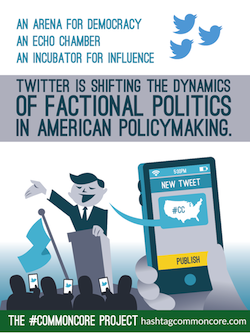Jonathan Supovitz explores Twitter debate over Common Core standards
When Jonathan Supovitz and a team of researchers started unpacking their study of the Twitter debate over Common Core State Standards, they saw a new type of political discourse.
 And to best explain what they found, Supovitz and his team with the Consortium of Policy Research in Education (CPRE) realized they needed a new way to present their research. Rather than a traditional academic paper, they created hashtagcommoncore.com, an interactive website built by Penn GSE’s web team that lets readers explore they dynamics of the Twitter debate.
And to best explain what they found, Supovitz and his team with the Consortium of Policy Research in Education (CPRE) realized they needed a new way to present their research. Rather than a traditional academic paper, they created hashtagcommoncore.com, an interactive website built by Penn GSE’s web team that lets readers explore they dynamics of the Twitter debate.
“The #commoncore project represents a new genre of research,” said Supovitz, a Penn GSE professor of Education Policy. “We tried to make our research more interactive and accessible to a wider audience in order to hopefully spark a meaningful conversation about the findings.”
For their study, CPRE Director Supovitz, Alan J. Daly of the University of California, San Diego, and Miguel Del Fresno of Universidad Nacional de Educación a Distancia in Madrid, Spain, tracked and analyzed around 190,000 tweets containing #commoncore, authored by about 53,000 distinct actors during a six-month timespan from September 2013 to February 2014. During that period, the debate moved into the mainstream. It became a campaign issue for politicians from both parties, as fights for re-writes and repeals gained traction.
The #commoncore project lets viewers see how actors form informal networks on Twitter, and how those networks create and amplify narratives. By dissecting these networks, the researchers tell the story of how ordinary citizens and social media advocacy groups can amass greater influence than so-called authority figures who would have dominated this conversation even a decade ago.
When they analyzed the language in the tweets, the researchers found that in many ways the Common Core debate has become a proxy war for broader disagreements about education policy and the very direction of the country. Some of the key people in this fight, they learn, don’t necessarily make the most provocative statements, but retweet information—some of it factual, some not—to a large and diverse collection of followers.
By graphing these networks and making them interactive, the researchers let visitors to the site see how this policy debate plays out in fascinating detail. In podcasts, some of the most influential members explain their views on the Common Core and what Twitter has done for them.
The researchers continue to track #commoncore. They are already seeing preliminary results suggesting the Twitter debate is evolving, even as it continues to grow, with more institutional actors stepping into the fray.
